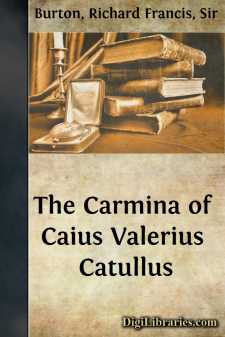Categories
- Antiques & Collectibles 13
- Architecture 36
- Art 48
- Bibles 22
- Biography & Autobiography 813
- Body, Mind & Spirit 142
- Business & Economics 28
- Children's Books 17
- Children's Fiction 14
- Computers 4
- Cooking 94
- Crafts & Hobbies 4
- Drama 346
- Education 46
- Family & Relationships 57
- Fiction 11829
- Games 19
- Gardening 17
- Health & Fitness 34
- History 1377
- House & Home 1
- Humor 147
- Juvenile Fiction 1873
- Juvenile Nonfiction 202
- Language Arts & Disciplines 88
- Law 16
- Literary Collections 686
- Literary Criticism 179
- Mathematics 13
- Medical 41
- Music 40
- Nature 179
- Non-Classifiable 1768
- Performing Arts 7
- Periodicals 1453
- Philosophy 64
- Photography 2
- Poetry 896
- Political Science 203
- Psychology 42
- Reference 154
- Religion 513
- Science 126
- Self-Help 84
- Social Science 81
- Sports & Recreation 34
- Study Aids 3
- Technology & Engineering 59
- Transportation 23
- Travel 463
- True Crime 29
The Carmina of Caius Valerius Catullus
Categories:
Description:
Excerpt
Dear Mr. Smithers,
By every right I ought to choose you to edit and bring out Sir Richard Burton's translation of Catullus, because you collaborated with him on this work by a correspondence of many months before he died. If I have hesitated so long as to its production, it was because his notes, which are mostly like pencilled cobwebs, strewn all over his Latin edition, were headed, "NEVER SHEW HALF-FINISHED WORK TO WOMEN OR FOOLS." The reason of this remark was, that in all his writings, his first copy, his first thought, was always the best and the most powerful. Like many a painter who will go on improving and touching up his picture till he has destroyed the likeness, and the startling realistic nature of his subject, so would Sir Richard go on weakening his first copy by improvements, and then appeal to me to say which was the best. I was almost invariably obliged, in conscience, to induce him to stick to the first thought, which had grasped the whole meaning like a flash. These notes were made in a most curious way. He used to bring his Latin Catullus down to table d'hôte with him, and he used to come and sit by me, but the moment he got a person on the other side, who did not interest him, he used to whisper to me, "Talk, that I may do my Catullus," and between the courses he wrote what I now give you. The public school-boy is taught that the Atys was unique in subject and metre, that it was the greatest and most remarkable poem in Latin literature, famous for the fiery vehemence of the Greek dithyramb, that it was the only specimen in Latin of the Galliambic measure, so called, because sung by the Gallæ—and I suspect that the school-boy now learns that there are half a dozen others, which you can doubtless name. To my mind the gems of the whole translation are the Epithalamium or Epos of the marriage of Vinia and Manlius, and the Parcae in that of Peleus and Thetis. Sir Richard laid great stress on the following in his notes, headed "Compare with Catullus, the sweet and tender little Villanelle, by Mr. Edmund Gosse," for the Viol and Flute—the XIX cent. with the I
"Little mistress mine, good-bye!
I have been your sparrow true;
Dig my grave, for I must die.
Waste no tear, and heave no sigh;
Life should still be blithe for you,
Little mistress mine, good-bye!
In your garden let me lie
Underneath the pointed yew,
Dig my grave, for I must die.
We have loved the quiet sky
With its tender arch of blue;
Little mistress mine, good-bye!
That I still may feel you nigh,
In your virgin bosom, too,
Dig my grave, for I must die.
Let our garden friends that fly
Be the mourners, fit and few.
Little mistress mine, good-bye!
Dig my grave, for I must die."
Sir Richard seriously began his Catullus on Feb. 18th, 1890, at Hamman R'irha, in North Africa. He had finished the first rough copy on March 31st, 1890, at Trieste. He made a second copy beginning May 23rd, 1890, at Trieste, which was finished July 21st, 1890, at Zurich. He then writes a margin. "Work incomplete, but as soon as I receive Mr....









